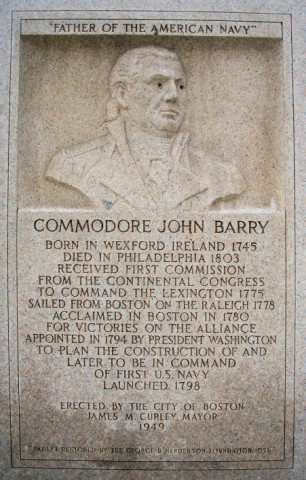
Commodore John Barry - Boston, MA
Posted by:  silverquill
silverquill
N 42° 21.332 W 071° 03.787
19T E 330088 N 4691313
This simple memorial to John Barry, "Father of the American Navy," is located in Parkman Plaza, part of the Boston Common. Barry served as a soldier, but most notably as a naval officer of distinction, noted for bravery, tenacity, loyalty, and skill
Waymark Code: WM7CYT
Location: Massachusetts, United States
Date Posted: 10/06/2009
Views: 20

"FATHER OF THE AMERICAN NAVY"
COMMODORE JOHN BARRY
Born in Wexford Ireland 1745
died in Philadelphia 1803
Received first commission
from the continental congress
to command the Lexington 1775
Sailed from Boston on the Raleigh 1778
Acclaimed in Boston in 1780
for victories on the Alliance
Appointed in 1794 by President Washington
to plan the construction of and
later to be in command
of first U.S. Navy
launched in 1798
Erected by the city of Boston
James M. Curley Mayor
1949
"Tablet restored by the George B. Henderson Foundation, 1976"
From
Smithsonian Art Inventory
Commodore John Barry was enlisted by President George Washington to create and command the country's first Navy. The original tablet was commissioned by the City of Boston in 1948 and was cast in bronze in 1949. The tablet was later stolen and in 1977 a granite copy was commissioned and installed through a gift of the Henderson Foundation. The original bronze was later returned and now resides at the Constitution Museum.
From
ushistory.org
Few Americans are well-acquainted with the gallantry and heroic exploits of Philadelphia's Irish-born naval commander, Commodore John Barry. Obscured by his contemporary, naval commander John Paul Jones, Barry remains to this day an unsung hero of the young American Republic. As most naval historians note, Barry can be classed on a par with Jones for nautical skill and daring, but he exceeds him in the length of service (17 years) to his adopted country and his fidelity to the nurturing of a permanent American Navy. Indeed, Barry deserves the proud epithet, "Father of the American Navy," a title bestowed on him not by current generations of admirers, but by his contemporaries, who were in the best position to judge.
In the space of 58 years, this son of a poor Irish farmer rose from humble cabin boy to senior commander of the entire United States fleet. Intrepid In battle, he was humane to his men as well as adversaries and prisoners. Barry's war contributions are unparalleled: he was the first to capture a British war vessel on the high seas; he captured two British ships after being severely wounded in a ferocious sea battle; he quelled three mutinies; he fought on land at the Battles of Trenton and Princeton; he captured over 20 ships including an armed British schooner in the lower Delaware; he authored a Signal Book which established a set of signals used for effective communication between ships; and he fought the last naval battle of the American Revolution aboard the frigate Alliance in 1783.
Barry was granted a Captain's commission in the Continental Navy, dated March 14, 1776, and signed by the President of Congress, John Hancock. Along with this commission went command of Barry's first warship, the brig Lexington.
In his first contest at sea, John Barry's cruiser Lexington had a successful one-hour battle with the British tender, Edward. Barry's own report to Congress of his fight conveys the atmosphere of excitement and exultation.
Barry's final battle of the Revolution was also the last sea battle of the Continental Navy. On March 10, 1783, Barry was returning from Havana aboard the Alliance escorting the Duc de Lauzon, a transport carrying a shipment of 72,000 Spanish silver dollars destined for the Continental Congress. Off the coast of Cape Canaveral, Florida, the Alliance fell in with the British frigate, the Sybil. In order to protect his escort and its precious bullion, Barry engaged the Sybil. A 45-minute exchange of gunfire ensued, with Barry directing his gun crews to superb results. The British vessel sheared off after experiencing severe punishment from the American crews who shattered her rigging, masts and hull.